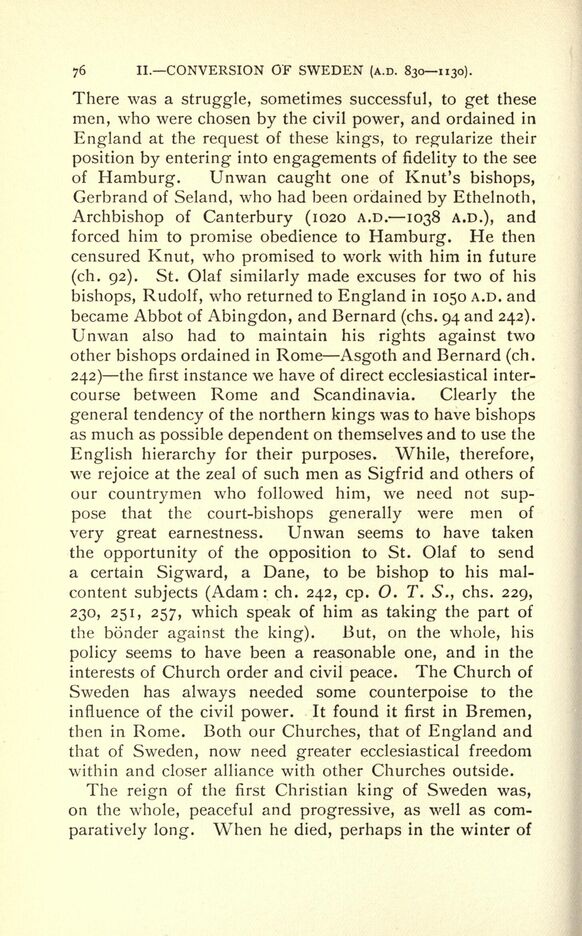
Full resolution (JPEG) - On this page / på denna sida - II. The Conversion of Sweden (830—1130 A.D.)

<< prev. page << föreg. sida << >> nästa sida >> next page >>
Below is the raw OCR text
from the above scanned image.
Do you see an error? Proofread the page now!
Här nedan syns maskintolkade texten från faksimilbilden ovan.
Ser du något fel? Korrekturläs sidan nu!
This page has never been proofread. / Denna sida har aldrig korrekturlästs.
;6 II. CONVERSION OF SWEDEN (A.D. 8301130).
There was a struggle, sometimes successful, to get these
men, who were chosen by the civil power, and ordained in
England at the request of these kings, to regularize their
position by entering into engagements of fidelity to the see
of Hamburg. Unwan caught one of Knut s bishops,
Gerbrand of Seland, who had been ordained by Ethelnoth,
Archbishop of Canterbury (1020 A.D. 1038 A.D.), and
forced him to promise obedience to Hamburg. He then
censured Knut, who promised to work with him in future
(ch. 92). St. Olaf similarly made excuses for two of his
bishops, Rudolf, who returned to England in 1050 A.D. and
became Abbot of Abingdon, and Bernard (chs. 94 and 242).
Unwan also had to maintain his rights against two
other bishops ordained in Rome Asgoth and Bernard (ch.
242) the first instance we have of direct ecclesiastical inter
course between Rome and Scandinavia. Clearly the
general tendency of the northern kings was to have bishops
as much as possible dependent on themselves and to use the
English hierarchy for their purposes. While, therefore,
we rejoice at the zeal of such men as Sigfrid and others of
our countrymen who followed him, we need not sup
pose that the court-bishops generally were men of
very great earnestness. Unwan seems to have taken
the opportunity of the opposition to St. Olaf to send
a certain Sigward, a Dane, to be bishop to his mal
content subjects (Adam: ch. 242, cp. 0. T. S., chs. 229,
230, 251, 257, which speak of him as taking the part of
the bonder against the king). But, on the whole, his
policy seems to have been a reasonable one, and in the
interests of Church order and civil peace. The Church of
Sweden has always needed some counterpoise to the
influence of the civil power. It found it first in Bremen,
then in Rome. Both our Churches, that of England and
that of Sweden, now need greater ecclesiastical freedom
within and closer alliance with other Churches outside.
The reign of the first Christian king of Sweden was,
on the whole, peaceful and progressive, as well as com
paratively long. When he died, perhaps in the winter of
<< prev. page << föreg. sida << >> nästa sida >> next page >>